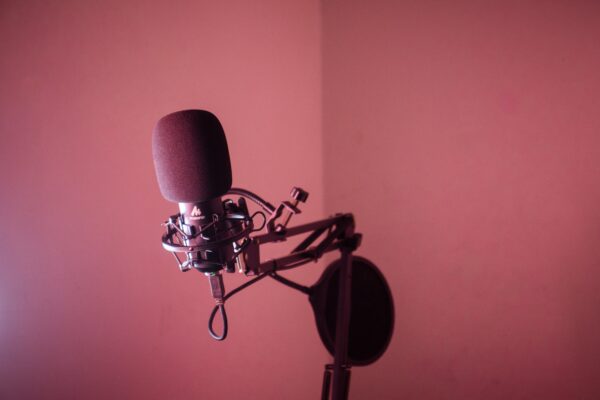This week at my day job, we restarted our popular open course on podcasting. (There’s still time to join, by the way, and you can register on our site.) In addition, I recently finally had the chance to listen “A Harem of Computers,” which is a new CBC Ideas radio documentary co-produced by a graduate of our podcasting course — and dedicated scholarly podcaster in her own right — Jennifer Jill Fellows. As we begin a new cohort at the same time as alumni are embarking on such amazing projects, I’m reflecting a little bit on the lessons I’ve learned as a podcaster and as a person who supports the development of podcasts.
It’s about community. I make three podcasts: two weekly shows and one longer form project that I am preparing for peer review. The main thing I have learned from my weekly shows (one of which I produce and one of which I strictly play the role of lazy talent on) is that community makes or breaks a show, and that a listenership doesn’t have to be large to be committed and vocal. It’s really rewarding to learn about the relationships that develop around the show you make — not just the oft-cited parasocial relationships to you as the host, but real, lasting friendships between people who wouldn’t have met without that shared space. And in the first year of the pandemic, I was delighted to see how our campus support podcast created a place of virtual community. I have always thought it was the intimacy of the podcast form that leads to this community-building; we listen to podcasts in our domestic spaces, often alone, often with a voice in our ears through earbuds. It’s certainly why I think Chuck and Josh from Stuff You Should Know are my actual friends.
Embrace a broad, diverse audience by being accessible first. Too often with academic projects, accessibility concerns are, at best, an afterthought. Part of building community is making your work usable for as many people as possible. For my work podcast, I insist on the show being day-one accessible, meaning that I make sure we provide transcripts in two modalities, a downloadable mp3 in addition to streaming on the web and on several platforms, and an accessible podcast website. I’m not perfect in these spaces and I’m always learning about how to improve our workflows to be mindful of the different access needs that exist for disabled listeners, rural and remote listeners, and other folks who may have specific needs. There are resources out there that you can use to make steps towards improving accessibility. With effort, podcasting really can be a democratic medium.
Making mistakes in public is okay. Often when I talk to faculty, they are concerned about the aspect of putting work out into the open and the criticism that may come from making mistakes in an open space. I have to say, as someone who makes a lot of mistakes in public, this hasn’t been my experience. Hand-in-hand with the community-building aspect of podcasting is the fact that the audience is looking to you to build something good and something meaningful. I have experienced my fair share of corrections and complaints since embarking on a podcasting practice, but almost entirely as an experience of calling in, not calling out. By that I mean that criticism and corrections have been generous and thoughtful, part of an act of solidarity and community to create the best possible product. I am grateful for what podcast audiences have taught me about inclusive language, in particular, and I don’t think I would be as careful with my words as I strive to be without that input. Don’t be afraid of making mistakes. Be afraid of not learning from them.
You have to get your hands dirty. In the podcasting course, there’s a direct corollary between people who get in and do the recording and editing assignments right away and those who finish the course. Audio is new to the majority of people who embark on the course, and there’s a lot of trepidation around committing the voice to a recording and then actually trying to manipulate it. To a one, participants are surprised and delighted to find out (at least in their self-report) that editing audio isn’t so hard, once you start playing with it, but that procrastinating on playing with it makes everything harder. We put the editing in Week 2 for this reason. In my experience, this is true of learning any new tool: at some point, you have to stop reading and thinking and start mucking in. Probably true for life, too.
You can DIY the whole thing. I am increasingly getting solicitations from sketchy folks claiming they will make “a podcast” of my articles or book chapters, so one of the most important things I think we do with the podcast course is showing folks how straightforward it is to self-host a podcast (especially because have great tools!). We support using WordPress with the Seriously Simple Podcasting plug-in.
I love supporting podcasting and building our capacity in this area — it’s fun and rewarding, and I still have so much to learn in this space.

Love this – “Don’t be afraid of making mistakes. Be afraid of not learning from them.” So true. And I’m “almost” inspired to take the podcasting course but timing isn’t good right now. I am enjoying learning from these blog posts though 🙂 Thank you! And for me to remember to check and read a blog daily is a feat in and of itself-alas, I didn’t do so well setting up the RSS feed…
I found a new app I quite like — Reeder, for the Mac. It’s quite clean. Trying to repopulate it with all the blogs I stopped following once I relied on Twitter to inform me of new posts is no small feat, I will say!